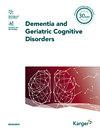Plasma Oxytocin Is Not Associated with Social Cognition or Behavior in Frontotemporal Dementia and Alzheimer’s Disease Syndromes
IF 2.2
4区 医学
Q3 CLINICAL NEUROLOGY
引用次数: 2
Abstract
Introduction: Changes in social behavior and emotion processing are common in frontotemporal dementia (FTD) and semantic dementia (SD), and less so in Alzheimer’s disease (AD). Recent research has investigated oxytocin as a potential treatment for these symptoms; however, whether plasma oxytocin is associated with social-emotional symptoms of dementia remains underexplored. Methods: Thirty behavioral-variant FTD (bvFTD), 28 SD, 39 AD, and 24 controls underwent blood sampling to measure oxytocin. Participants completed an emotion processing battery. Carers completed the Cambridge Behavioral Inventory and the Neuropsychiatric Inventory. Results: Patients with bvFTD were severely impaired in emotion processing and behavioral ratings, with milder impairment in SD and AD. No difference in plasma oxytocin was observed between groups (p = 0.632). No significant associations were found between oxytocin and social behavior or emotion processing (r values between −0.241 and 0.227, all p values >0.099). Conclusion: Our results indicate that plasma oxytocin is not reduced in dementia and is unrelated to social, emotional, and behavioral features. We noted high interindividual variability in our data; hence, future investigations should consider methodological influences such as serum versus saliva and diurnal variation on oxytocin function. These results demonstrate that current measurement measures of plasma oxytocin have limited utility in determining the role of oxytocin in FTD. Alternative oxytocin measures may prove more sensitive and should be considered when conducting clinical trials.额颞叶痴呆和阿尔茨海默病综合征患者血浆催产素与社会认知或行为无关
引言:社交行为和情绪处理的变化在额颞叶痴呆(FTD)和语义痴呆(SD)中很常见,在阿尔茨海默病(AD)中则不那么常见。最近的研究已经调查了催产素作为这些症状的潜在治疗方法;然而,血浆催产素是否与痴呆症的社会情绪症状有关仍有待深入研究。方法:对30例行为变异型FTD(bvFTD)、28例SD、39例AD和24例对照组进行了抽血测定催产素。参与者完成了情绪处理电池。Carers完成了剑桥行为量表和神经精神量表。结果:bvFTD患者的情绪处理和行为评分严重受损,SD和AD受损较轻。两组之间的血浆催产素没有差异(p=0.632)。催产素与社会行为或情绪处理之间没有发现显著关联(r值在-0.241和0.227之间,所有p值均>0.099)。结论:我们的研究结果表明,痴呆症患者的血浆缩宫素没有减少,与社会、情绪和行为特征无关。我们注意到我们的数据中存在较高的个体间变异性;因此,未来的研究应该考虑血清与唾液以及催产素功能的昼夜变化等方法学影响。这些结果表明,目前血浆催产素的测量方法在确定催产素在FTD中的作用方面的效用有限。替代性催产素措施可能更敏感,在进行临床试验时应予以考虑。
本文章由计算机程序翻译,如有差异,请以英文原文为准。
求助全文
约1分钟内获得全文
求助全文
来源期刊
CiteScore
4.70
自引率
0.00%
发文量
46
审稿时长
2 months
期刊介绍:
As a unique forum devoted exclusively to the study of cognitive dysfunction, ''Dementia and Geriatric Cognitive Disorders'' concentrates on Alzheimer’s and Parkinson’s disease, Huntington’s chorea and other neurodegenerative diseases. The journal draws from diverse related research disciplines such as psychogeriatrics, neuropsychology, clinical neurology, morphology, physiology, genetic molecular biology, pathology, biochemistry, immunology, pharmacology and pharmaceutics. Strong emphasis is placed on the publication of research findings from animal studies which are complemented by clinical and therapeutic experience to give an overall appreciation of the field.

 求助内容:
求助内容: 应助结果提醒方式:
应助结果提醒方式:


